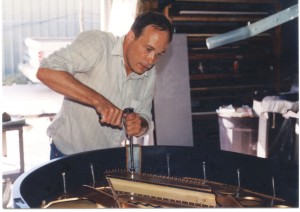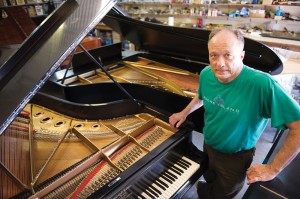
Growing up with two younger sisters and a younger brother in a two-room fishing camp, a life in the arts was the furthest thing from Hufford’s mind. Then when he was nine, a mysterious truck came rumbling down Meandering Avenue and brought something into his life that he had not known was missing: music.
Sherry Slate is the oldest of Hufford’s three siblings. She remembers the truck making its way down the aptly named road, breaking off overhanging branches as it came. The truck was carrying the first of a set of buildings that would become the Providence Baptist Church. In the church a piano was installed. The preacher was Max Kurtz, a Viennese Jew who had converted to the Baptist church, the first person to encourage the young boy’s interest in piano.
“I’d go to church, the pianist would begin to play, and the hair on the back of my neck stood up,” Hufford recalled. “So I decided I wanted to play the piano. We were too poor then and didn’t have a place to put a piano. So I’d go to church and practice.”
Kurtz supported his desire to learn, eventually providing him with a key to the church so he could practice on the upright piano whenever he wanted. At home, his parents bought him a toy piano that he used to plunk out familiar tunes that he learned by ear. The music was a welcome distraction from the family’s scrappy existence.
“We didn’t have a bathroom or a tub [in our home],” Slate recalled. “We didn’t even have a television until the ’60s. We’d wear our school clothes to school, hang them up, and put them on again the next day. But for us kiddos it was great. We played outside a lot.”
Playing outside offered the youngsters a break from tensions at home. Robin’s father Robert was an alcoholic who nonetheless managed to hold down jobs — for a while. After losing his job at General Dynamics, Robert caught and sold baitfish for a few months to camps around Lake Worth before being hired by the Fort Worth Water Department.
His father, Robin recalled, was quick to make friends but emotionally distant with his children. The void was partly filled by their mother, Olga Hufford. But neither parent had a college degree or much ambition for their children’s future, leaving Robin to tutor and help his siblings with schoolwork.
“Music was [Robin’s] saving grace,” Slate said. “I think it was an escape for him.”
For the next few years, Hufford taught himself music, relying on a sharp ear and improvisation. Then when he was about 12, he may have become the first kid in Fort Worth history to use lawn-mowing profits to pay for private piano lessons. With his formal lessons, he was introduced to great composers like Mozart, Beethoven, and Chopin.
“It seemed like he was always practicing,” Slate recalled.
When Robin was 16, his parents divorced and Olga moved the family south to Alvarado to be near her brother and to work as a nurse. It wasn’t long before Hufford’s restless spirit kicked in, and he moved to California to be with his father’s half-brother for a few months, only to find they couldn’t get along.
The move set him back academically. When he returned to Fort Worth for his senior year at Arlington Heights High School, he had to take summer and night courses to graduate with his classmates.
By then the Vietnam War was heating up, and Hufford knew he would likely be drafted. Without financial help of any kind, college was not an option. So while he watched old friends go off to college to get exemptions from the draft, he waited for the inevitable.
“I got a letter from the President of the United States,” he recalled. “It said ‘Greetings, you are ordered to this and that.’ ”
Hufford had a hard time with authority figures, one of the main reasons he runs his own business today. He wasn’t sure he could handle the Army, but he did, with a little help from his talented fingers.
******
Hufford was in Vietnam, assigned to an Army infantry unit, when an officer came around asking if anyone knew how to type.
Having bought a typewriter and taught himself basic typing skills at the age of 13, Hufford raised his hand. The act may have saved his life.
“Isn’t that bizarre for a kid?” he said. “Years later, here I am in a combat unit” using that childhood skill to get out of combat.” He passed the typing test and spent the rest of his year in Vietnam at First Infantry Division headquarters, taking dictation and typing letters and messages.
When Hufford came home in 1966, it was to little fanfare. Bill and Camilla Huffman, owners of the fishing camp he had grown up in, organized a small party, inviting many old friends from his years at Lake Worth.
His interest in music rekindled, Hufford enrolled in college and began practicing relentlessly, but he didn’t think majoring in music was practical. After taking courses in cellular biology at the University of Texas at Arlington, he transferred to the University of North Texas, partly to have access to the large music faculty there.
At the time Lili Kraus was a famous concert pianist and teacher. Hufford soon enrolled in her studio at Texas Christian University while also taking music courses at UNT.
“She was a wonderful musician and had a beautiful approach to phrasing,” he recalled.

A job as night watchman at the Fort Worth City Club paid for most of the tuition. The job meant long, boring hours patrolling the club’s top floors, where the pool table and piano were located. But it also meant he got to schmooze with people like Van Cliburn, who complimented his playing.
On some nights after patrons left, Hufford would sneak in friends like Jim Gordon to enjoy the club’s amenities, such as the bar and game room. Gordon and Hufford had met in 1972 at the Fort Worth Chess Club. They quickly found they had similar interests and views, but they disagreed on who was the better chess player. (Gordon said Hufford was “always too aggressive.”)
As the young pianist’s abilities grew, so did his interest in another facet of music. At an estate sale, he had stumbled upon a heavily discounted Steinway Grand whose owners had perished in a plane crash. He bought it and hired Travis Burgett, a staff tuner for the TCU School of Music, to keep it in tune. The two soon became friends, and Hufford would occasionally drive the blind technician to clients’ homes and watch him work. The work appealed to Hufford’s mechanical inclinations, and the money was pretty attractive too.
“I was making $1.80 an hour working at the City Club, and here he was making $22 tuning one piano,” Hufford recalled.
Soon after the two met, Burgett died from the effects of a brain tumor; he was 54.
“I was only 29 at the time, and I thought he was old,” Hufford said with a laugh. “Now I’m 15 years older than he was [then]. Young people and the illusion of time, the delusion of what time is.”
After practicing the basics on his Steinway, he began to tune for friends and colleagues. In 1977 a technician for the Van Cliburn Foundation recommended that Hufford join the Piano Technicians Guild and become certified in the craft.












Excellent writing, Eddie.
I own a Chickering 141 and it is one of the best pianos i have ever had the privilege to play and own.
The middle and top are bell like in sound and the bass is wonderful as well. It was totally rebuilt by a master technician about 14 years ago.
john gallagher